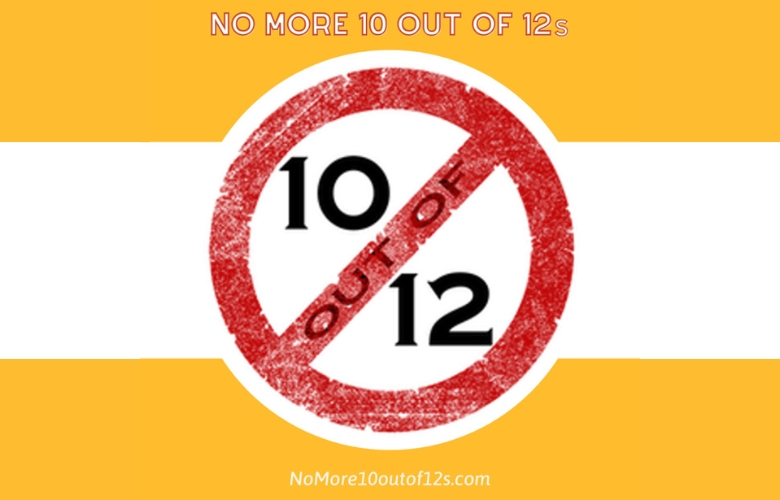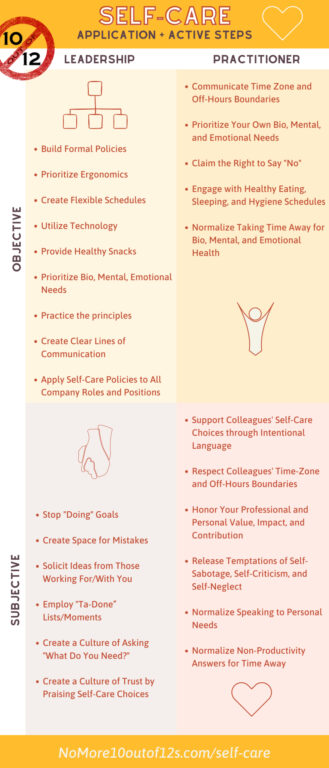
Summer stock season is upon us, and many young sound folks will take a variety of jobs working on a LOT of shows. And while many strides have been made in improving working conditions for these young workers, a LOT more work still needs to be done to support theatre workers of all ages.
For that reason, I am taking this month’s blog to shed some light on an advocacy project that I strongly believe in the movement to abolish the “10/12” technical rehearsal, which is being spearheaded by nomore10outof12s.com. This fight feels especially relevant right now since this feels like the first summer that many theatre operations will truly resemble their pre-pandemic selves, with full use of indoor venues, reduced or eliminated health and safety protocols, and a full, ambitious slate of programming. So let’s dive into the practice, why it’s harmful, and what can be done to stop it.
For those who don’t know, a 10/12 (pronounced “Ten Out Of Twelve”) is a type of technical rehearsal that is allowed to be scheduled a certain number of times over the tech process by most Actors Equity Association contracts. How many times exactly depends on the contract. On a 10/12 rehearsal day, the cast is called for a total of 10 hours over a 12-hour span of a day. So, for example, their schedule might look something like this:
12:00 pm Cast Half-Hour (dressing, mic-ing, and applying hair and makeup count as work)
12:30 pm-5:00 pm Tech Onstage
5:00 pm-7:00 pm Cast Dinner
7:00 pm Cast Half-Hour
7:30 pm-12:00 am Tech Onstage
12:00am Cast Released
You may have noticed that the only people I have discussed in a working context so far are actors. As those of us working in theatre know all too well, a 12-hour day for the actors is likely a much longer day for just about everyone else. There are work notes to complete, the stage needs to be set, and the costumes, wigs, and mics to be ready for donning. For that all to happen in time, everyone else working on the show who is not an actor will have arrived long before that noon call. They will also likely stay at the theatre after midnight cleaning up, powering down, and resetting. As a result, the span of day for the technicians in particular is often closer to 13/15, or even 14/16, which is simply not okay, Additionally, there can be pressure on designers to spend their meal breaks accomplishing work notes or holding discussions with their fellow creatives rather than walking away completely to go and eat somewhere other than one’s tech table. Designers I’ve spoken to have also told me that while a staff stagehand at a regional theatre might only be in tech for a few weeks out of the year on various shows, they will need to design as many shows as possible in a year just to get by. This means that many designers and associates get stuck in a cycle of being perpetually in tech, particularly in 10/12s, with no time in between for the body to rest and reset.
Not only is the 10/12 a long day, but a growing amount of research on workplace efficiency has shown that more hours of does not produce more results. In my time working in theatre and working 10/12s, I have consistently noticed 2 things:
Business Roundtable Studies suggest that there is a ceiling for productivity that exists around 40 hours a week. This means that working for 60, or even 80 hours in a week still only yields about 40 hours of productivity. Therefore, theatre companies that schedule 10/12s are, in essence, paying more money in the form of overtime for the same amount of work and no real gain.

Safety is also at even greater risk when theatre workers are overextended from practices like 10/12s. Multiple scientific studies have shown that physical exhaustion and psychological fatigue lead to poorer judgment and more time loss due to accidents or errors, especially in the 9th to 12th hours of a shift. One morning notes call on a 10/12 tech day, I was so tired that I told my coworker I did not feel safe climbing a ladder to fix a broken overhead camera. I was asked to climb the ladder anyway. At the time, I didn’t feel like I had the power to say no, and thankfully nothing went wrong. That said, it still makes me shudder to think about how this could have ended worse, and that 7 years later other workers might still be finding themselves in similar predicaments.

My own stories and memories of the past 10/12s still haunt me, but then I think about what a privileged position I am in. I am a white, financially stable, childless woman, and I have a partner at home who can help with household tasks when I have an extra-busy week. If I am feeling this affected by 10/12s, then it would logically follow that other more marginalized groups are affected even more negatively by it. And the data bears this out.
Based on the reasons that I have already outlined, it is easy to see the ways in which the 10/12 perpetuates racism, ableism, and our industry’s existing stigma against caregivers, to name just a few of its crimes. No More 10 out of 12s has held multiple online seminars diving into why 10/12s specifically harm the BIPOC community, parents (and other caregivers such as those with aging parents at home), the disability community, lower-income folks, and others. These talks can be viewed at nomore10outof12s.com/events.
From watching these talks and reading the online testimonials, it is easy to empathize with someone who, for example, has a young child at home, and would therefore be additionally burdened by having to work childcare around such a torturous schedule. That person might get even fewer hours of sleep once they finally arrived home due to needing to pump milk or wake up early enough to do a school drop-off before going to the theatre. As someone who wants to have children in the next few years, the thought of having to balance my family’s needs with such a grueling schedule terrifies me.
If a theatre does not provide housing and someone’s socioeconomic status means that they live farther away than most of their coworkers, then we can see that this might make some workers’ days even longer than it already is. One testimonial on the website from a BIPOC lighting designer reads, “I can only leave my house so early in the morning to avoid traffic.” Another says, “Not all of us can afford cabs home late at night, trains run even slower, and the further out you live because of rent, the harder the cycle becomes.” And since the many regional theatres in the USA are located in city centers or downtown areas with expensive rents, systemic racism and NIMBYism in housing policy means that folks who are BIPOC and/or don’t come from generational wealth will be harder hit in this area.
We See You White American Theatre (WSYWAT) rightly points out that theatre writ large is still a PWI (Predominantly White Institution). Therefore the effects of having no life outside work (and no access to a support system or affinity group) will hit nonwhite workers harder. One designer says, “The culture of our business is a turn-off for them [her BIPOC students].” Multiple quotes on the website attest to BIPOC folks feeling like the long hours and poor treatment just aren’t worth it. Teachers report that their BIPOC students are not pursuing theatre for this reason. This is precisely why one of the demands that WSYWAT made in their manifesto was for the elimination of 10/12 rehearsals.
Looking at what 10/12s demand on the human body makes it easy to see how folks in the disability community would also be disproportionately affected by 10/12s. The long hours spent sitting at uncomfortable seats (or no seat) with few breaks are already hard on those of us who are able-bodied. Lack of sleep can exacerbate health conditions for many people, and the need to take medications with food or at certain times of day can be challenging to balance when working anywhere from 80 minutes to 2 hours at a time without a break. The lack of agency that marginalized workers feel can make it hard to advocate for one’s needs. And this isn’t something anyone should have to do in the first place.
10/12s can also be a serious impediment to folks who are practicing religion. One anonymous testimonial of nomore10outof12s.com says, “I was working on a musical during Ramadan, 2 10/12 days while fasting…Instead of stage management moving the 2-hour dinner break to later in the day, they kept it as is.” Having myself been in tech on Yom Kippur (the holiest Jewish holiday, which is observed by fasting), I recall having to beg for the morning off to go to temple, and then watching everyone else eat on the 5 pm dinner break while I had to wait until 7 pm for my crew comrades to bring me a plate of snacks. I also remember being in tech on Easter Sunday once, and company management decided to put together a special ham dinner for everyone, but no alternative meal was provided for me or anyone else who didn’t eat ham, even though pork products are not kosher and, to boot, it was also Passover, which meant I and other Jewish members of the company was abstaining from eating bread.
Taken together, the research, coupled with these testimonials, clearly demonstrates the ways in which 10/12s cause both general and specific harms, and how a lack of recognition, validation, or even the slightest accommodation for one’s identity, needs, and practices can really add insult to injury.
As I mentioned above, the practice of 10/12s is not just harming people, it is pushing them away from pursuing theatre as a career. Multiple quotes on the website speak to this feeling of hopelessness: that even though theatre is the person’s passion, they can’t justify pursuing it if this is what the conditions will be like. Couple that with the chronic low pay, an expectation of invisible labor, a pervasive “the show must go on” attitude, and an overall culture that tells us simultaneously that we should be grateful to be here because we get to do what we love but also that we are instantly replaceable, and it’s easy to see that we are jeopardizing our own future as an industry. So, how do we fix it?
The first answers are obvious, and also the hardest. If Actors’ Equity contracts outlawed the 10/12 rehearsal, then actors wouldn’t be allowed to work more than an 8-hour day, which might have the effect of shortening hours for everyone else. Other unions such as IATSE could step in and make the overtime penalties for work days exceeding 12 hours even higher, but at this point, most large-scale theatres on Broadway and elsewhere have accepted tech overtime as the “cost of doing business” and accounted for it in their budgets. Theatre rent is usually extremely expensive, so producers on for-profit shows will want to get the show loaded in, teched, and playing to paying audiences as soon as possible. Therefore, it is in their financial interests to squeeze as much work as possible into as few hours as possible, even though it takes such a massive toll on the people doing the work. Additionally, since 10/12s are so baked into the culture, stagehands, in particular, have come to depend on the “tech bump” when doing their personal budgets and assessing their income, so taking it away in one fell swoop without raising the wages to a more livable standard in other ways could again have a disproportionately negative effect on the neediest among us.
Given that there is no national governing body of the arts in the US, legislation also seems unlikely to help here. And while I would love to live in a world where no employer is allowed to schedule any worker for more than 12 hours at a time, that just isn’t going to happen at the national level. So this leaves the obvious next choice of grassroots action and advocacy. The more theatre workers support No More 10/12s, the more theatres and producers will have to listen. And many already have. A list of companies that are no longer doing 10/12s can be found on the website, and, having worked at a few of them myself, I can say that the tech process overall was smoother, more humane, and more productive.
Of course, there are exceptions. Even this year, at a theatre that has eliminated 10/12 rehearsals, I and the rest of the sound team found ourselves working 3 consecutive 13/15 days because of morning band rehearsals and sound checks followed by a full 8-hour day of tech. I know that as evening came on those days, I could feel my productivity waning. I had even made arrangements to get rides home from coworkers because I knew that I didn’t want to have the pressure of having to drive even the 5 minutes back to my housing. Statements are nice, but one action isn’t enough. We clearly aren’t there yet if some departments (especially sound and wardrobe/wigs/makeup) are still putting in a lot of “invisible labor” around the tech day and working such long hours, even when the actors’ day has been made more reasonable.
As for me, I have made it a point to tell designers that I will not work for them on a show that is doing 10/12s. I’ve told them point blank that these working conditions prohibit me from doing my best work, and that I will not sacrifice my body and mind in this way ever again. And given that one of them once had to hug me while I had an inexplicable exhaustion-fueled emotional breakdown at the end of one such night, I’m guessing they believe me. But to risk losing a job over this takes a lot of privilege and self-advocacy, and I am lucky to have enough of a platform to be able to be picky about what work I choose to take. Most people working in theatre do not have this. So extra effort is needed from those of us who have a voice and some power to speak up for others. Directors and designers (especially those who are in demand) can tell theatres that they will not work there if 10/12s are being scheduled. Production Managers can appeal to their leadership about how 10/12s are limiting their ability to hire good candidates. Everyone can sign the petition at https://www.change.org/p/producers-end-10-out-of-12-tech-days-and-6-day-work-weeks-in-professional-theatre so that those in charge see that “this is a top priority for our theatre community.” And lastly, we can all work to take better care of ourselves and each other by extending a little more grace when we find ourselves stuck in a system that is built to disadvantage us. I hope this blog has encouraged you to learn more about this cause and to join the movement for #NoMore10OutOf12s!

By Becca Stoll
Benefits of a Full-Time Job in Audio


The mission of SoundGirls.org is to inspire and empower the next generation of women in audio. Our mission is to create a supportive community for women in audio and music production, providing the tools, knowledge, and support to further their careers. SoundGirls.Org was formed in 2013 by veteran live sound engineers Karrie Keyes and Michelle Sabolchick Pettinato and operates under the Fiscal Sponsorship of The California Women’s Music Festival, a 501(c)3 non-profit organization. In 2012, Karrie and Michelle participated in the “Women of Professional Concert Sound” panel at the AES Conference in San Francisco. The panel was hosted by the Women’s Audio Mission (WAM) and moderated by WAM founder Terri Winston. Terri brought together five women working in live and broadcast audio. The groundbreaking panel (which also included Jeri Palumbo, Claudia Engelhart and Deanne Franklin), provided young women and men a glimpse into life on the road, tips and advice, and a Q & A with the panelists. More importantly though, was how incredibly powerful the experience was for the panelists. We had all been in the business for 20 years or more, yet most of us had never met before that day and within minutes we bonded like long-lost sisters. We were struck by how similar our experiences, work ethics, and passions were and wondered why our paths had never crossed and how our careers would have been different had we been there to support each other through the years. Each of us are strong on our own, but together we were even stronger and a powerful force. We were empowered. Each of us had been asked hundreds of times in our careers: Are there other women doing sound? How did you get into sound? How would a young woman go about getting into sound? Through creating SoundGirls.Org, we hope to establish a place for women working in professional audio to come for support and advice, to share our success and failures, our joys and frustrations, and for empowerment and inspiration.
Read Full Profile© 2021 TheatreArtLife. All rights reserved.

Thank you so much for reading, but you have now reached your free article limit for this month.
Our contributors are currently writing more articles for you to enjoy.
To keep reading, all you have to do is become a subscriber and then you can read unlimited articles anytime.
Your investment will help us continue to ignite connections across the globe in live entertainment and build this community for industry professionals.